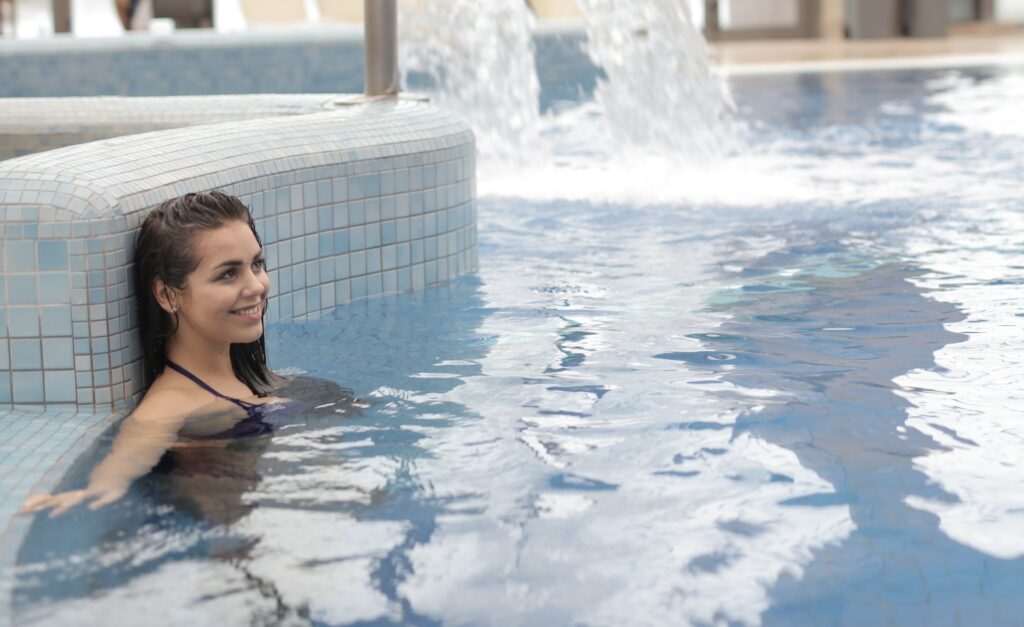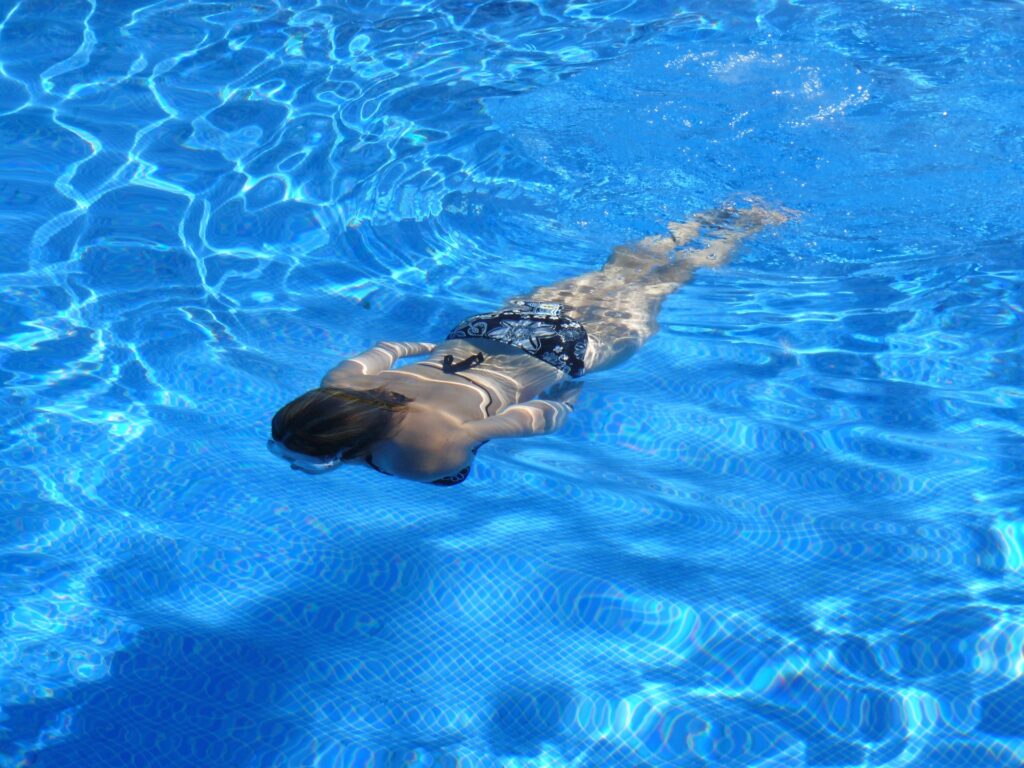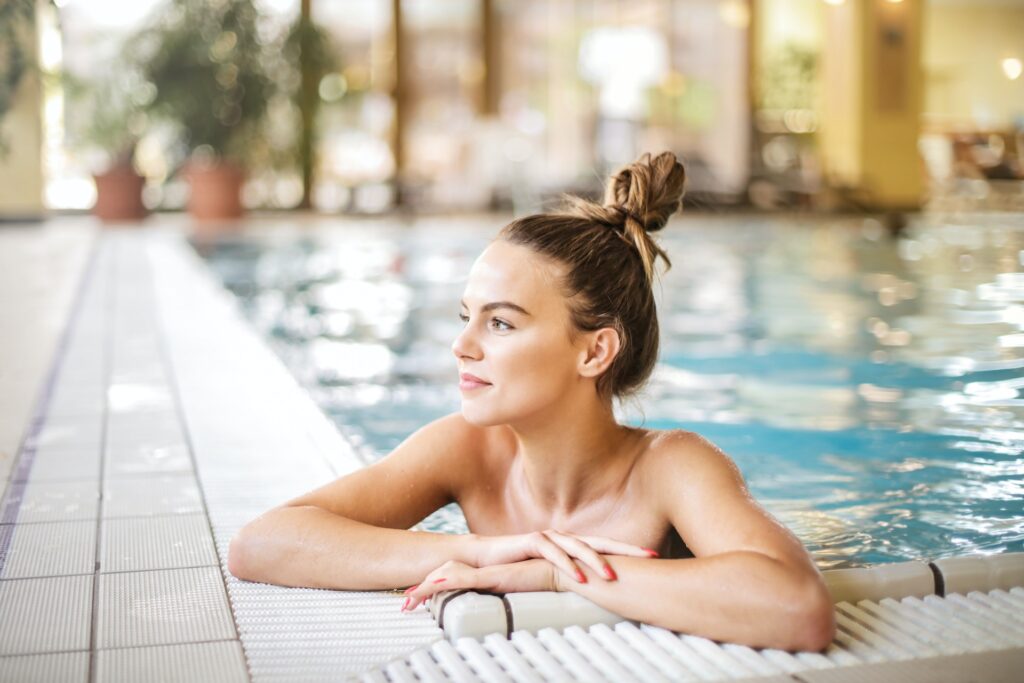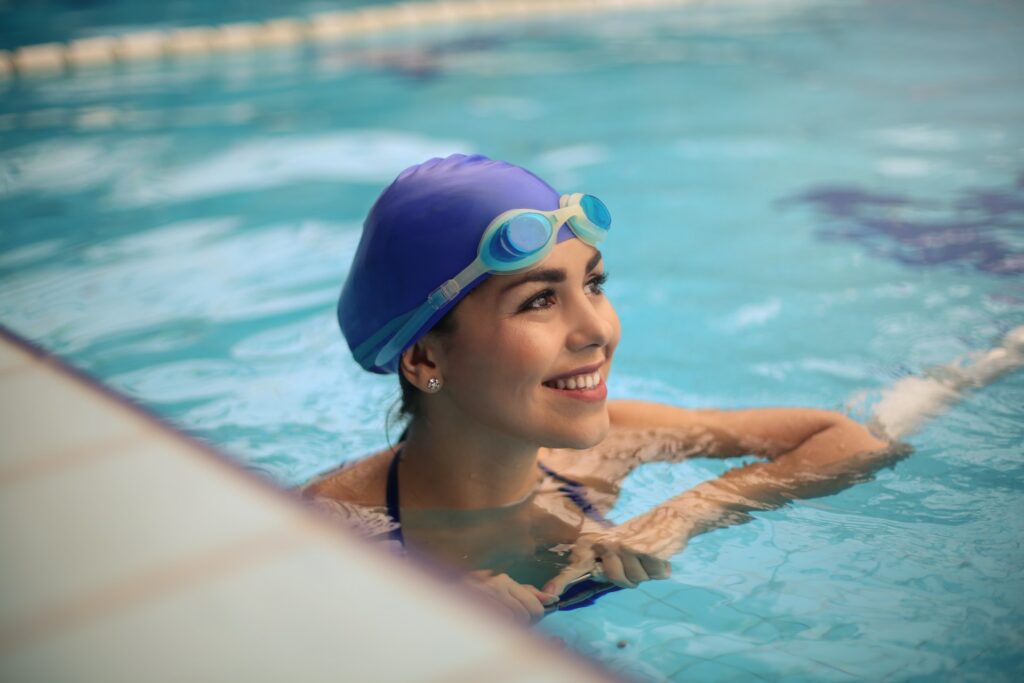Chlorine in swimming pools can turn hydrated healthy hair into dry, brittle one. It also makes hair look fried and super damaged. So, you must know how to protect hair from chlorine to maintain your hair health while enjoying swimming in the pool.
In this article, I will include the top steps on how to protect hair from chlorine, how chlorine damages hair, how swimmers keep their hair healthy, and more FAQs.
Table of Contents
Key Takeaways:
- Frequent exposure to chlorinated water makes your hair dry, dull, and unhealthy. It also leads to color fading and hair damage.
- How to protect hair from chlorine damage? Wear a swim cap, rinse your hair, use a good chlorine removal shampoo, deep condition your hair, use natural hair masks, apply leave-in conditioner, tie your hair up, use protective natural oils, and don’t use hairstyling tools.
- What do professional swimmers do to protect their hair? They wear a swim cap, rinse their hair with clean water and leave-in conditioner or conditioner before swimming, rinse their hair after swimming, shampoo their hair 2-3 times, and apply a hydrating conditioner to their hair.
What Does Chlorine Do To Your Hair?

Chlorine is a chemical element used to keep swimming pools bacteria-free and clean. It sanitizes water and protects swimmers from infections.
But when your skin, hair, and scalp are exposed to chlorinated water:
- It strips your skin, hair, and scalp of their natural oils. Chlorine leaves hair dry, dull, and brittle.
- Chlorine affects the scalp’s health, it causes irritation, dryness, and inflammation.
- Frequent exposure to chlorinated water lead to hair damage, split ends, and hair thinning.
- It turns hair green as chlorine reacts with natural hair color and dyes and bonds with proteins in hair which causes oxidation, making your hair color fades faster.
Also, some hair types are more susceptible to chlorine damage than others including:
- Chemically-treated hair.
- Fine or thin hair.
- Bleached hair.
- Blonde hair.
- Dry hair.
How To Protect Hair From Chlorine?
It’s essential to know how to protect hair from chlorine properly if you are a frequent pool swimmer to keep your strands healthy and nourished. Here’s what to do:
1- Rinse Hair Before And After Swimming
Take a shower and rinse your hair with fresh water before jumping into the pool. When your hair is already wet and saturated with clean water, it absorbs less chlorinated water which means less hair damage.
This step helps you also get rid of sweat and skin care products like deodorant and aftershave that could interact with chlorine and make your skin irritated.
After swimming, rinse your hair with clean water and use a gentle clarifying shampoo if possible to remove all chemicals from your hair.
2- Wear A Swim Cap
It’s highly recommended to wear a swim cap before hopping into the pool especially if you’re a professional swimmer. This helps protect your hair from chlorine as it will not reach your hair and damage it.
Also, to provide the best protection, rinse your hair with clean water before wearing the cap to prevent any further damage and make the cap fit easier.
3- Use Gentle Shampoo And Conditioner For Swimmers

After getting out of the pool, it’s best to wash your hair with gentle and sulfate-free shampoo to wash away all harsh chemicals from your hair and prevent damage.
Follow with a hydrating conditioner for swimmers so it can replenish moisture and coat your strands to repair the damage.
Related: Homemade Deep Conditioner For Damaged Hair: Best 6 Recipes
4- Use Natural Protective Oils
Chlorine strips hair of its natural oils so to protect your hair, apply to your strands natural oils that are known to seal the hair and create a protective layer. Oils include coconut oil, olive oil, argan oil, and jojoba oil.
These oils will help prevent your hair from absorbing excess water that contains chlorine which will keep hair healthy.
Related: 23 Easy Pro Secrets On How To Keep Your Hair Healthy
5- Use Leave-In Swim Conditioner
After washing and conditioning your hair, apply a generous amount of a good leave-in conditioner that is designed for swimmers.
It can repair and protect hair from damage caused by chlorine and the sun. Plus, it will moisturize and help you detangle your hair gently.
Opt for a leave-in conditioner that is free of harsh chemicals to support hair health and restore hair shine.
TIP: instead of using oils, apply your leave-in conditioner to your wet hair before swimming to protect your hair from absorbing chlorine!
6- Tie Your Hair

When you’re relaxing in the pool, keep your hair out of the water by tying up your hair in a ponytail or tight bun. This helps minimize the damage and leaves hair protected and hydrated.
7- Try Hair Masks
It’s highly recommended to improve your haircare routine if you’re a frequent pool swimmer by using homemade hair masks at least once a week.
Natural hair masks can repair hair damage, increase hydration, combat frizz, improve hair health, smooth strands, boost shine, and prevent color fading.
Look for recipes that contain moisturizing and repairing ingredients like olive oil, ashwagandha oil, coconut oil, moringa oil, vitamin E oil, aloe vera, argan oil, rosewater, or biotin.
8- Avoid Heat Styling Tools
After shampooing and conditioning your hair, avoid using the blow dryer or hair straightener as they will dry out your hair even more.
Also, use a wide-toothed comb to detangle wet hair gently and avoid pulling out hair harshly.
How Do Swimmers Take Care Of Their Hair?
If you’re swimming in the pool daily, you should:
- Wear a swim cap.
- Rinse your hair with water and apply a leave-in conditioner or natural oil to your hair before swimming.
- Avoid shampooing your hair daily as this will make it super dry and frizzy. What you do instead is wash your hair with a gentle shampoo 2-3 times a week to remove chlorine buildup frequently.
- Deep condition your hair.
- Use hair masks 1-2 times a week to boost hair health.
- Apply a leave-in conditioner after washing your hair to keep it protected.

FAQs:
How Can I Protect My Hair While Swimming every day?
– Rinse your hair with water before and after swimming.
– Use gentle shampoo for chlorine removal and deep condition your hair.
– Look for leave-in conditioners for swimmers.
– Apply natural protective oils to your hair.
– Wear a swim cap.Should I Put Oil On My Hair Before Swimming?
Yes. Before hopping into the pool, rinse your hair with clean water and apply natural oil, conditioner, or leave-in conditioner to your wet hair. Your hair will be already soaked with clean water and oils so it will absorb less chlorinated water.
What Removes Chlorine From Hair?
After getting out of the pool, rinse your hair with clean water ASAP and wash it with your gentle shampoo to wash away chlorine to avoid damaging your hair.
Do Anti-chlorine Shampoo Work?
Yes. Shampoos for chlorine removal can wash away drying chemicals and buildup from hair effectively without stripping hair from its natural oils.
Should I Put Conditioner On My Hair Before Swimming?
Yes. Before jumping into the pool, rinse your hair with clean water and apply conditioner or leave-in conditioner to your hair. This will coat your hair and protect it from absorbing chlorinated water.
Is Chlorine Damaging To Hair?
Yes. Chlorine strip your hair of its natural moisture which will leave it looking dry, brittle, rough, and damaged.
The Bottom Line
If you’re wondering how to protect hair from chlorine to maintain its shine and healthy look, there are a few steps you should follow to get the best results.
Those steps will help you keep your hair healthy and prevent frizz, dullness, and damage. Check them above and let me know what you usually do to protect your hair from chlorine!
Feature Image Source: Pexels.com/@olly/
